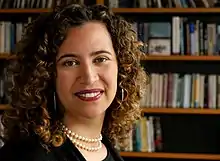Meredith Broussard
Meredith Broussard is a data journalism professor at the Arthur L. Carter Journalism Institute at New York University.[1] Her research focuses on the role of artificial intelligence in journalism. As a fellow at the Tow Center for Digital Journalism at the Columbia University Graduate School of Journalism, she built Bailiwick, a tool designed to uncover data-driven campaign finance stories, created for the United States presidential election of 2016.[2] She was previously a features editor at The Philadelphia Inquirer, and a software developer at the AT&T Bell Labs and MIT Media Lab. Broussard has published features and essays in many outlets including The Atlantic, Harper’s Magazine, and Slate Magazine.
Meredith Broussard | |
|---|---|
 Broussard in 2018 | |
| Born | United States |
| Education | Columbia University, Harvard University |
| Occupation | Associate Professor, Arthur L. Carter Journalism Institute NYU |
| Known for | Research in artificial intelligence and investigative reporting; coining the term "technochauvinism" |
| Website | meredithbroussard |
Publications
Broussard has published a wide range of books examining the intersection of technology and social practice. Her book Artificial Unintelligence: How Computers Misunderstand the World, published in April 2018 by MIT Press, examines the limits of technology in solving social problems.[3] She has been profiled in Communications of the ACM[4] and cited by Christopher Mims of The Wall Street Journal as an expert in the future of self-driving car technology.[5]
- Artificial Unintelligence: How Computers Misunderstand the World[3] Positive reviews appeared in The Philadelphia Inquirer,[6] American Scientist,[7] ZDNet,[8] and in the Royal Society of Chemistry's publication, Chemistry World.[9]
- "Broken Technology Hurts Democracy"[10]
- "Challenges of archiving and preserving born-digital news applications"[11]
- "How to Think About Bots"[12]
- "New Airbnb Data Reveals Some Hosts Are Raking In Big Bucks"[13]
- "The Irony of Writing Online About Digital Preservation"[14]
- "The Secret Lives of Hackathon Junkies"[15]
- "When Cops Check Facebook"[16]
- "Big Data in Practice: Enabling Computational Journalism Through Code-Sharing and Reproducible Research Methods"[17]
- "Preserving News Apps Presents Huge Challenges"[18]
- "Why Poor Schools Can't Win at Standardized Testing"[19]
- "Artificial Intelligence for Investigative Reporting"[20]
References
- "Meredith Broussard". Journalism.nyu.edu.
- "Washington Post Monkey Cage Blog". Washington Post.
- Broussard, Meredith (2018-04-01). Artificial Unintelligence. Mitpress.mit.edu.
- "Putting the Data Science into Journalism". Cacm.acm.org.
- Mims, Christopher (2018-09-13). "Driverless Hype Collides With Merciless Reality". Wall Street Journal. ISSN 0099-9660. Retrieved 2020-12-22.
- "Meredith Broussard's 'Artificial Unintelligence': Against the fetish of the machine". 2.philly.com.
- "Fixing Tech's Built-In Bias". Americanscientist.org. 2018-08-06.
- "Artificial Unintelligence, book review: Exploring the limits of technology". Zdnet.com.
- "Artificial Unintelligence: How Computers Misunderstand the World". Chemistryworld.com.
- Broussard, Meredith (May 12, 2017). "Broken Technology Hurts Democracy". The Atlantic.
- International Federation of Library Associations and Institutions. 43(2) 150–157. 2017. doi:10.1177/0340035216686355.
- Broussard, Meredith (February 23, 2016). "How to Think About Bots". Motherboard.
- Broussard, Meredith (December 2, 2015). "New Airbnb Data Reveals Some Hosts Are Raking In Big Bucks". Huffington Post.
- Broussard, Meredith (November 20, 2015). "The Irony of Writing Online About Digital Preservation". The Atlantic.
- Broussard, Meredith (July 8, 2015). "The Secret Lives of Hackathon Junkies". The Atlantic.
- Broussard, Meredith (April 19, 2015). "When Cops Check Facebook". The Atlantic.
- Digital Journalism. (Taylor & Francis) 2015. doi:10.1080/21670811.2015.1074863.
- Newspaper Research Journal. 36(3) 299 –313. 2015. doi:10.1177/0739532915600742.
- Broussard, Meredith (July 15, 2015). "Why Poor Schools Can't Win at Standardized Testing". The Atlantic.
- Digital Journalism. (Taylor & Francis) 2014. doi:10.1080/21670811.2014.985497.